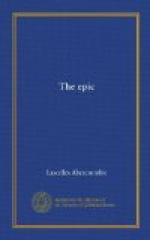But there are one or two poems in which the old union seems still happy. Most noteworthy is Goethe’s Hermann und Dorothea. You may say that it does not much matter whether such poetry should be called epic or, as some hold, idyllic. But it is interesting to note, first, that the poem is deliberately written with epic style and epic intention; and, second, that, though singularly beautiful, it makes no attempt to add anything to epic development. It is interesting, too, to see epic poetry trying to get away from its heroes, and trying to use material the poetic importance of which seems to depend solely on the treatment, not on itself. This was a natural and, for some things, a laudable reaction. But it inevitably meant that epic must renounce the triumphs which Milton had won for it. William Morris saw no reason for abandoning either the heroes or anything else of the epic tradition. The chief personages of Sigurd the Volsung are admittedly more than human, the events frankly marvellous. The poem is an impressive one, and in one way or another fulfils all the main qualifications of epic. But perhaps no great poem ever had so many faults. These have nothing to do with its management of supernaturalism; those who object to this simply show ignorance of the fundamental necessities of epic poetry. The first book is magnificent; everything that epic narrative should be; but after this the poem grows long-winded, and that is the last thing epic poetry should be. It is written with a running pen; so long as the verse keeps going on, Morris seems satisfied, though it is very often going on about unimportant things, and in an uninteresting manner. After the first book, indeed, as far as Morris’s epic manner is concerned, Virgil and Milton might never have lived. It attempts to be the grand manner by means of vagueness. In an altogether extraordinary way, the poem slurs over the crucial incidents (as in the inept lines describing the death of Fafnir, and those, equally hollow, describing the death of Guttorm—two noble opportunities simply not perceived) and tirelessly expatiates on the mere surroundings of the story. Yet there is no attempt to make anything there credible: Morris seems to have mixed up the effects of epic with the effects of a fairy-tale. The poem lacks intellect; it has no clear-cut thought. And it lacks sensuous images; it is full of the sentiment, not of the sense of things, which is the wrong way round. Hence the protracted conversations are as a rule amazingly windy and pointless, as the protracted descriptions are amazingly useless and tedious. And the superhuman virtues of the characters are not shown in the poem so much as energetically asserted. It says much for the genius of Morris that Sigurd the Volsung, with all these faults, is not to be condemned; that, on the contrary, to read it is rather a great than a tiresome experience; and not only because the faults are relieved, here and there,




